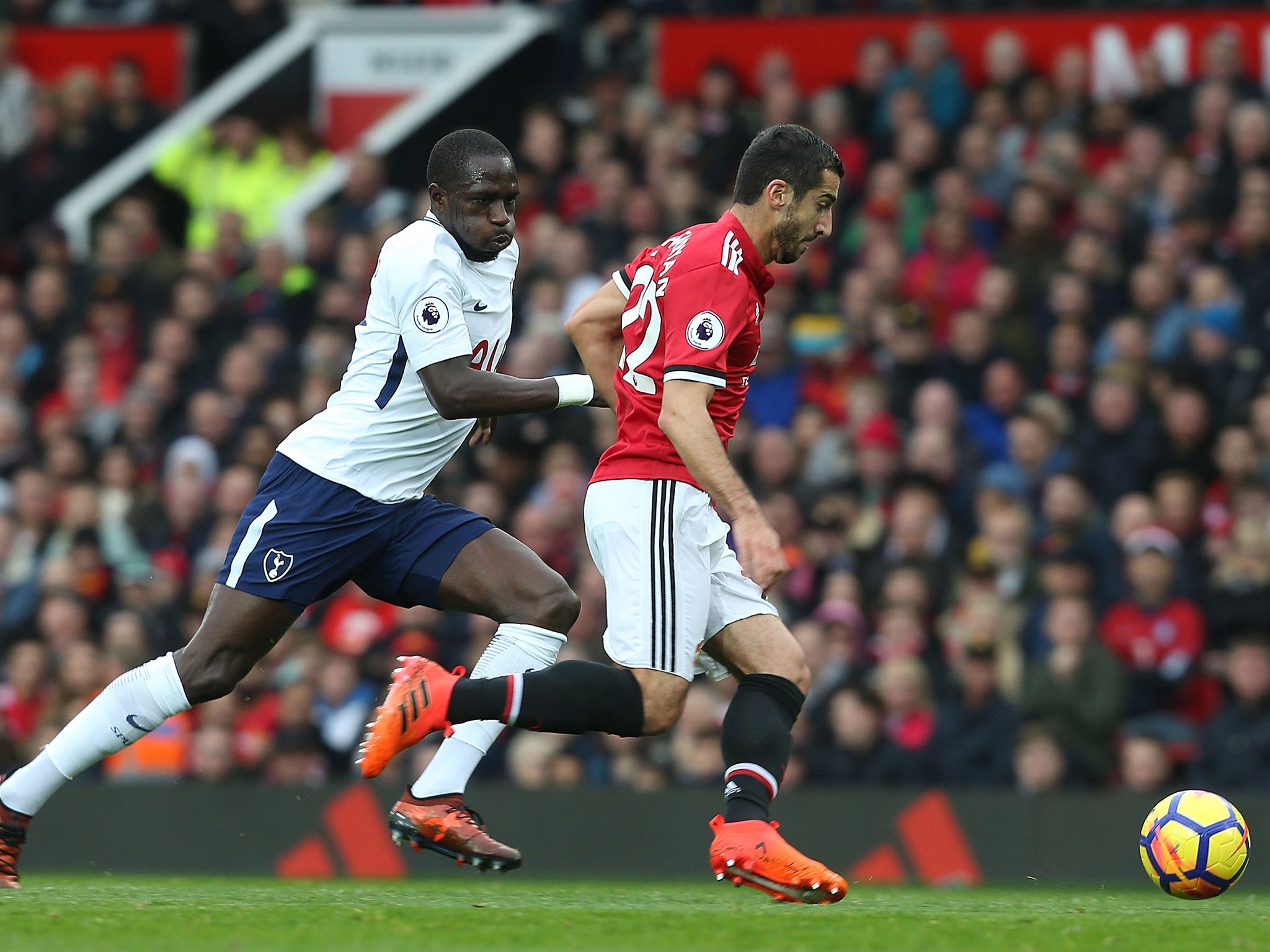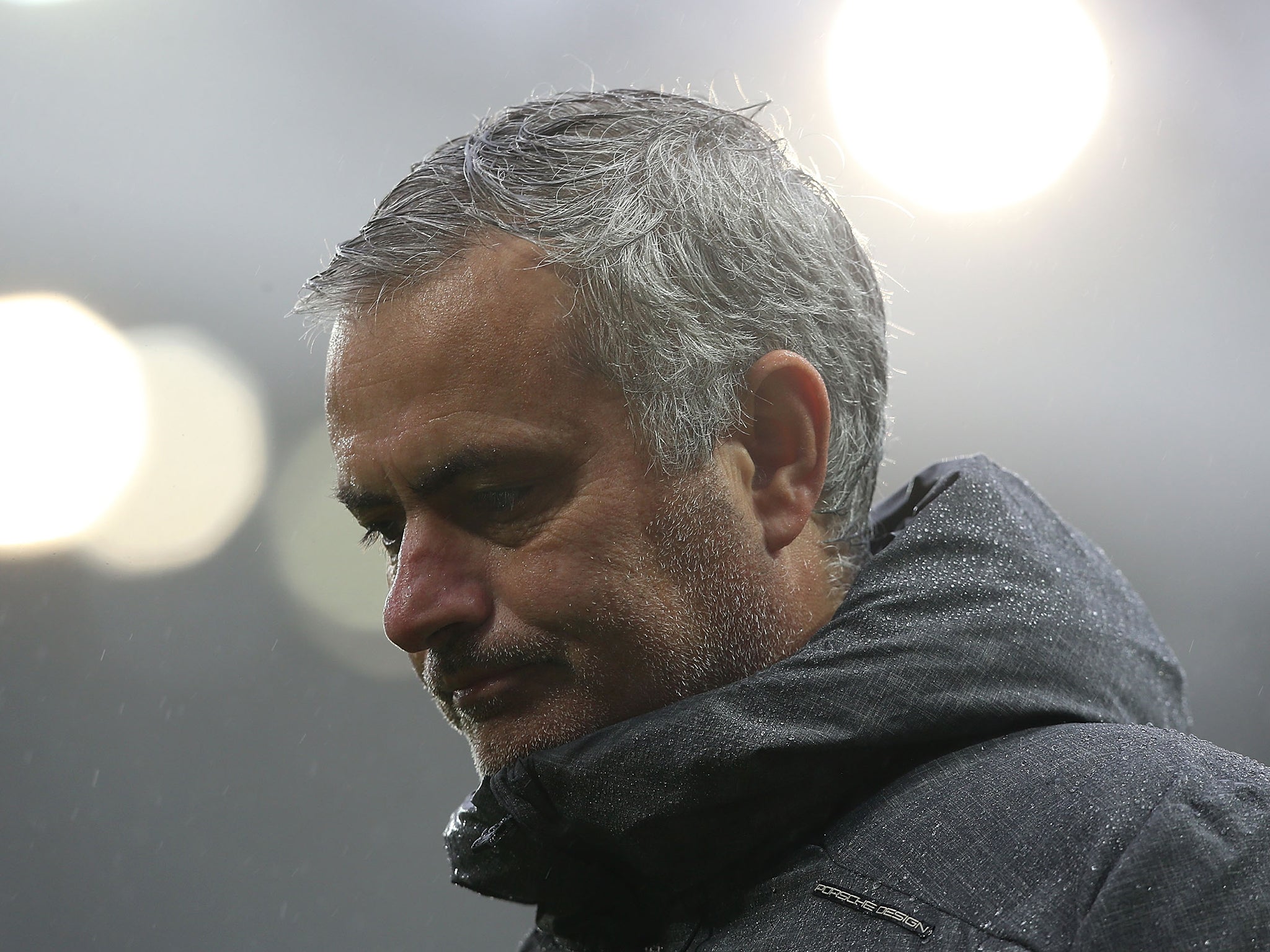Henrikh Mkhitaryan becomes Jose Mourinho's new caged bird in defence-first Manchester United performance
The free-flowing Armenian who lit up Dortmund is no more, and in his place stands a £26m barrier that spent more time cutting Harry Winks out of the game than playing himself into it

Your support helps us to tell the story
From reproductive rights to climate change to Big Tech, The Independent is on the ground when the story is developing. Whether it's investigating the financials of Elon Musk's pro-Trump PAC or producing our latest documentary, 'The A Word', which shines a light on the American women fighting for reproductive rights, we know how important it is to parse out the facts from the messaging.
At such a critical moment in US history, we need reporters on the ground. Your donation allows us to keep sending journalists to speak to both sides of the story.
The Independent is trusted by Americans across the entire political spectrum. And unlike many other quality news outlets, we choose not to lock Americans out of our reporting and analysis with paywalls. We believe quality journalism should be available to everyone, paid for by those who can afford it.
Your support makes all the difference.As an unloveable, goalless first half wound itself to a fraught but ultimately fruitless conclusion, the gaze was drawn to one of the electronic advertising hoardings just beyond the touchline, one of those where the text crawls slowly along the side of the pitch and it’s always fun to see whether Phil Jones can outpace it. The advert was for an exclusive documentary on MUTV, promising “an unmissable look into the life of Henrikh Mkhitaryan”.
A few yards away, marooned well inside his own half, we were getting our own peek into Mkhitaryan’s quotidian existence, and it was a good deal less glamorous than MUTV would probably care to admit. As Tottenham’s three centre-backs rolled the ball around, Mkhitaryan’s task – which he was carrying out to the letter – was to cut off their out-ball to Harry Winks by any means necessary.
So Mkhitaryan chased. He screened. He grappled. He got his foot in, and did the dirty work. And to be fair, he did an immaculate job. Tottenham’s prodigious playmaker was nothing like the influence he has been in recent weeks. It was just that £26m seems like a lot of money to pay for someone to mark Harry Winks.
Of course, Manchester United got their win, and a much-needed one it was too. In despatching Mauricio Pochettino’s curiously errant Tottenham side, they firmly re-established themselves as the main challengers to Manchester City in the title race, and with four trophies still to play for, all remains well in Jose Mourinho’s world. The triumphant fist-pumps and embraces that greeted full-time at a sodden Old Trafford were testament to a job well done, a plan supremely executed.
But Mkhitaryan was not on the pitch to celebrate with his team-mates. He had been substituted a full half-hour earlier, sacrificed for Jesse Lingard, who may lack Mkhitaryan’s creativity or dynamism, but is very definitely Jesse Lingard. And though United are entitled to bask in their success, the case of Mkhitaryan was a curious microcosm of this United side, and where it may ultimately be heading.
There is nothing new, naturally, in Mourinho deploying an attacking player in a largely reactive, destructive role. And nothing intrinsically Mourinho-ish about it either. This is, after all, the fate that awaits everyone at Old Trafford eventually. Antonio Valencia was a flourishing winger that was later converted into a snappy right-back. Ashley Young was once sufficiently well-regarded as an attacking force to feature at No10 for England at Euro 2012, but now cuts a sadly becalmed figure, his trademark bursts of pace now more usually employed to put the ball out for a throw.
Daley Blind arrived at Old Trafford with fanciful ideas of running the Manchester United midfield, only to realise that – surprise! – no such role actually existed in the first place. In fact you could argue that even the Manchester United midfield is itself a dazzling mirage, a footballing constitutional monarchy, something to tell the tourists, a cruel trick to play on new signings. In big games, certainly, there is no United midfield, only staggered tiers of defence.

And so Mkhitaryan settled into his new reality, like his team-mates pressing high and pressing well. The cries of anti-football will again rear their head against Mourinho’s side but in truth they were a good deal more enterprising than they had been at Anfield. The full-backs were both allowed to cross the halfway line, sometimes both even at the same time, which in Mourinho’s world is the tactical equivalent of a cheeky Scotch before breakfast.
Meanwhile Mkhitaryan tucked in, kept his discipline, lest Ander Herrera and Nemanja Matic, tucking in behind him, should somehow both lose their discipline. And it was hard to imagine that this was how he imagined his United career turning out after creating such an impression at Dortmund with his thrilling turn of pace and excellent vision. Give him the ball on the half-turn and watch him shrug off his attendant like a padded jacket, spinning and releasing, a whirring dervish in a team full of them.
The full-backs were allowed to cross the halfway line, sometimes at the same time, which in Mourinho’s world is the equivalent of a cheeky Scotch before breakfast
And at times, to be fair, Mkhitaryan has shown flashes of that flair. He started this season excellently, plundering five assists in his first three games. But as United’s campaign geared up, Mkhitaryan seemed to gear down: no longer as fluid, no longer as effervescent, a bird in a cage. Yet it was no coincidence, surely, that when Mkhitaryan finally got some time on the ball, he managed to fashion two of United’s best chances.
Ten minutes into the second half, he received the ball on the edge of the area, and for a moment looked vaguely bewildered to be receiving it - “Is this some mistake? What do I do now? Can I press myself?” - before finally curling in a weak shot that almost led to a goal by Romelu Lukaku on the rebound. Seconds later, high on the fumes of freedom, he charged around the outside of the Tottenham defence and put in a cross from the left from which Lukaku had a shot blocked.

Not long after that, though, the party was over. The fourth official’s board went up, and with a dull inevitability, Mkhitaryan looked up to see his number – 22 – lit up in red, and Lingard’s number 14 lit up in green. Mkhitaryan trudged off with the grim stoicism of a man who has every right to be disappointed, but none at all to be surprised.
Mourinho would probably argue that management is about setting up a team to get a result in a given fixture. And after this win, he would certainly have a point. He might even argue in private that Mkhitaryan is not quite up to the role demanded of him, which is why that well-known defensive linchpin Mesut Özil is being linked with a move in January.
But equally, it is hard to see how this manager, this approach, this style of play, can possibly be of maximum benefit to a player whose fragile confidence and rarefied gifts clearly require a certain encouragement. You can say that players should fit into a system. Alternatively, you can say that any system is about getting the best out of the players you are given. Really, that's a debate for another time. But right now, it’s not hard to guess which of those two teams Mkhitaryan would rather play in.
Join our commenting forum
Join thought-provoking conversations, follow other Independent readers and see their replies
Comments